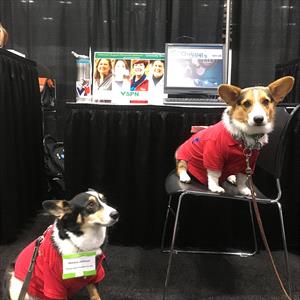Coffee Table Snooze

Owen rests his weary head on the coffee table. Photo by Charlotte Waack.
Throughout the years I was a veterinary technician in clinical practice, many clients asked me about what breed of dog they should get. That is a tough question because each breed has their own personality traits, behavior tendencies, predisposition to specific health issues, exercise recommendations, grooming procedures, and so forth.
During college classes in veterinary technology, I learned about basic behavior, about some of the diseases and conditions to which certain breeds may be predisposed, and to identify American Kennel Club (AKC) recognized breeds. However, we do not have any in-depth training on everything about every breed. What we do learn in school is how to research a breed, what health certifications a given breed should have, such as Companion Animal Eye Registry, Orthopedic Foundation for Animals, PennHIP, and others. Much of our knowledge on what breed is best for a given individual or family comes from our own experience.
My husband and I were down to one dog after losing our wonderful Samoyed rescue Izzy to renal disease. While our Australian Shepherd enjoyed being an only dog, he was getting older and I felt we needed a second dog in our household, especially one that was young and energetic. I travel often for my employer (Veterinary Information Network, or VIN, the parent of VetzInsight) and on many of my trips, I get to hang out with a wonderful Pembroke Welsh Corgi named Wallace. Wallace has become the VIN mascot at many conferences in the U.S., wearing his “I’m a VINner” polo. After spending so much time with this cute and personable Corgi, I started my due diligence to see if this was a good breed for me and my husband.
I have experience with the Pembroke Welsh Corgi breed or at least quite a bit of exposure. When I showed Samoyeds in AKC conformation shows in the 1990s, two of my friends showed their Corgis. We also cared for my friends’ Corgis at the veterinary clinic where I worked at the time. So I had knowledge of their behavior, health issues, temperament, and coat care needs (they shed a lot). Then there is my time with Wallace, the VIN mascot. Wallace’s owner and I are often on the same flights and we work all day together. I am Wallace’s designated babysitter when his owner needs to leave our work area at conferences.
Therefore, I felt I had a pretty good idea of what I was getting into when I first thought about bringing a Corgi into our home.
I first went to the AKC website and looked at their information on the Pembroke Welsh Corgi. I knew the basics…they have short legs. They are a herding breed. They are often spunky! I learned about the history, that they originated in Wales (that Welsh in their breed name makes so much more sense now!). I think we all know that England’s Queen Elizabeth is extremely fond of Corgis and has owned them most of her life. The AKC website also has the breed standard, which is what dogs are judged by in conformation dog shows. I was not too interested in the breed standard as I was not planning on showing my dog.
Next, I went to the Pembroke Welsh Corgi Club of America (PWCCA) website where I knew I would really get into the nitty gritty of this breed. National breed clubs are run by people who love the breed and have years and years of experience. They want prospective owners to know it all: the good, bad and truly ugly so an informed decision can be made.
The PWCCA also has the breed standard, but they have more information about buying a corgi, an FAQ, a genetics and health issues page, and a list of rescue groups. A couple of areas impressed me. They said to think about who in the house would care for the dog, what function would the dog have in your home (a companion for a child or elderly person, play with rowdy teens, work with cattle), and what temperament would best serve your home. The FAQ addresses other issues that the AKC website does not, such as shedding, exercise needs, and why pet stores are not a good place to purchase a puppy.
They also have a page on health issues that are prevalent in the breed such as hip dysplasia, von Willebrand's disease, degenerative myelopathy, elbow dysplasia, and cardiac health. Since Pembroke Welsh Corgis are a true dwarf (chondrodysplastic) breed, there are inherent health issues that come with that condition. They can be prone to back injuries and cruciate ligament tears because many can be rambunctious and athletic. They love to jump and catch tennis balls and Frisbees.
Wallace and Owen PW corgis

Owen (on the chair) hangs out with Wallace at a conference. Photo by Wallace's person, Michael Johnson.
The PWCCA also recommends that prospective owners talk to many other Corgi owners. This is much easier now than when I researched Samoyeds back in the late 1980s. Social media, blogs, YouTube videos all have a ton of Corgi owners who love to share information about their dogs. What I learned from social media was that this breed is a large dog in a small dog’s body. They think they are 100 lbs, but in reality are only 30 lbs and about 10 inches tall. They can have attitude, food and toy aggression issues, become too protective of their owners, chew on everything in sight, and of course herd everything that moves around them. They are clowns, loving to entertain their owners and anyone watching. They can be daredevils, jumping on to the couch in a single bound. Some Corgis even tolerate being dressed up.
I wanted to adopt a Corgi from a rescue, but ran into many hurdles. I live on three acres and work with my dogs on good recalls and do not let them loose without supervision, so they are safe from car traffic, but many rescues strictly require fences. The next issue was my cat. I guess Corgis are a bit more prey driven than I first thought and many may attack cats. Then there was the issue of my older Australian Shepherd. Almost every dog I found needed to be in a single dog household. Last, too many available dogs needed homes without children, and my husband and I have young grandchildren that visit. So, I started a whole new chapter of research to find a breeder that I wanted to purchase a puppy from.
This long journey started in early 2015 when my Samoyed was diagnosed with renal disease. I wanted to do some research before I was grieving deeply. My research took almost 4 months from her diagnosis before I found what I was seeking. I have had my Corgi, Owen, for almost 2 years now. It has been a journey, that’s for sure! He has food aggression issues. He is almost too possessive of me and will fight if the older dog or cat come too close when Owen is sitting on my lap. He does not like to share his toys with the other dog. In fact, all toys must be his and his alone. He has many of the breed’s not-so great traits.
On the other hand, he is so much fun! He can run and play for hours. He does cute things like falling asleep on the coffee table. He cuddles with me when I am not feeling well or am a little down. He just knows when I need it because I am his person. He can spot a squirrel outside a mile away. And he thinks he can catch the deer that run in the pasture behind our property, although his little bitty legs just do not go fast enough.
We can do our best to research all the issues and try to get the best representation of a breed or pick the best dog in the shelter. But even veterinary professionals end up with dogs that are not the best example of a breed. I will always work to help Owen be a better dog and to get over some of his food and toy issues. But I will not make excuses for him because he is not meant to be a perfect dog or be a replica of the well-behaved Wallace. He is Owen, and has his own personality and his own brand of spunk!
4 Comments
Phil Deruvo
November 4, 2020
Carolyn Thoreson
September 17, 2020
Sydney Buckner
August 30, 2020
Mitch Cassell
November 18, 2019